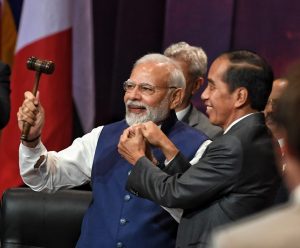As this year’s G-20 Summit comes to a close, India will be taking up the presidency for the coming year. Under most ordinary circumstances, analysts would now be writing extensively about how hosting the G-20 is a great opportunity for an emerging India to finally lay out its global vision. But these aren’t ordinary circumstances.
This year’s G-20 was hosted by Indonesia — another emerging power that has long punched below its weight and hoped to fulfill its leadership potential on the world stage. Its vision was laid out meticulously heading into 2022: In the post-pandemic era, Indonesia hoped to champion a more equitable recovery of the global economy, address sustainable development problems, and discuss debt relief.
Then Russia invaded Ukraine.
In Bali, discussions were upstaged earlier this week by a missile blast in Poland. The United States and its Western allies essentially separated out for an emergency parley on the crisis. Inevitably, the summit was then overshadowed by the G-20’s incongruence with the war. The final declaration addressed the war and its humanitarian and economic impact. But it then caveated those observations by admitting that “there were other views and different assessments of the situation and sanctions.”
A lot can change before next year’s G-20 Leaders’ Summit. But it increasingly looks inevitable that the war will carry over into India’s presidency. That will make it extraordinarily difficult for India to define and roll out its vision for the world, as many in New Delhi would have hoped to do.
India’s balancing act between Russia and the West will naturally be tested. Ahead of the summit in Bali, speculation abounded over whether Russia’s President Vladimir Putin and his Western counterparts would be able to share a room. That problem was somewhat eased by Putin’s decision not to attend. But that didn’t stop the Russian delegation from clashing with the West over its narrative of the war. Ahead of closed-door negotiations, Indonesia’s President Joko Widodo conceded, “I understand we need huge efforts to be able to sit together in this room.”
A bigger challenge for New Delhi — and the G-20 itself — is perhaps to find a way to make the forum more relevant in a world that is now defined almost entirely by geopolitical fissures and security crises.
In the face of political polarization around the world, many diplomats and analysts have tried to keep forums such as the G-20 focused on economic policy coordination to solve the post-pandemic world’s recovery problems. Indeed, the G-20 was established precisely for those purposes. As a group representing over 80 percent of the world’s GDP and 75 percent of its trade, the G-20 was primarily meant to be a body that coordinates economic policy to ensure a more stable global economy. As the Bali declaration pointed out, “The G-20 is not the forum to resolve security issues.”
Yet, that statement is a cop-out. In an atmosphere of coercive economic measures and countermeasures between geopolitical rivals, the G-20’s goal of economic policy coordination is entirely unattainable unless the underlying geopolitical tensions are engaged with in some form. As the International Monetary Fund’s managing director, Kristalina Georgieva, put it, “You can’t solve a problem of geopolitics with economic policy measures.”
This conundrum now poses a serious existential crisis for the G-20. Emerging economies continue to show interest in keeping geopolitics out and shaping the G-20 as a forum to lobby the developed world for economic support. The West, however, is increasingly losing interest.
In recent times, the G-7 — an economic group composed of the U.S. and its allies — has turned into a forum to coordinate policy measures against China and Russia. Washington now sees the G-20 primarily as a forum to convince the rest of the world to do the same. During the summit in Bali, Western leaders used their opening speeches primarily to call on others to step up pressure on Putin to end the war.
The challenge for the G-20 over the coming year, therefore, is to find a way to broker dialogue on critical geopolitical issues so that a pathway can be laid to return to the agenda of economic cooperation. If India can find a way to do that as host, then it would most truly have arrived as a global power.































